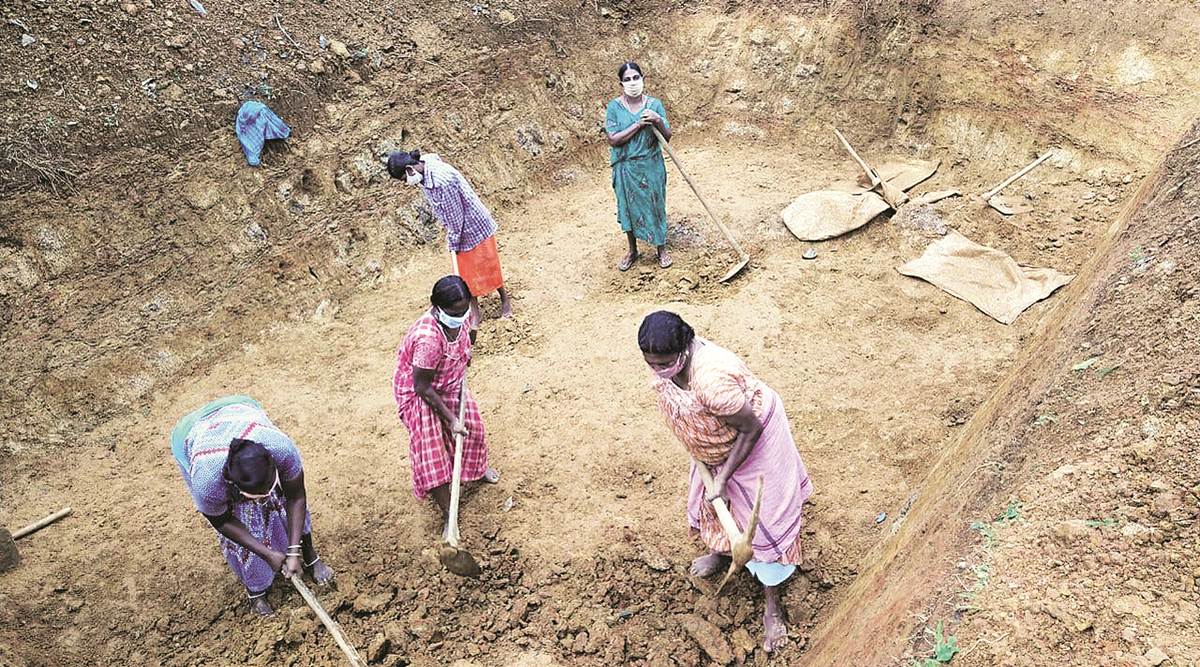 A farm pond under construction at Elikulam panchayat in Kottayam. (Express)
A farm pond under construction at Elikulam panchayat in Kottayam. (Express)Kerala has deployed as much as 29 per cent of the expenditure under the Mahatma Gandhi National Rural Employment Guarantee Scheme (MGNREGS) for asset creation in this fiscal so far. This is the highest allocation for asset creation by the state in recent years.
The move is aimed at ensuring that beneficiaries get not just 100 days of paid work but also a sustainable livelihood to overcome the crisis induced by the pandemic.
As per MGNREGS norms, 40 per cent of the labour budget can be used for creating durable, productive assets, both public and individual.
The state’s performance in creating assets has been low in recent years. In 2018-19, Kerala spent 8.51 per cent of the allocation for asset creation, which is spent on materials and skilled work. Last fiscal, this rose to 14.26 per cent.
A source from the state MGNREGS mission said, “This fiscal, the state has already spent 29 per cent of the budget allocation for creating assets, mainly livelihood ones, which are in high demand due to the economic crisis in the wake of Covid-19. The national average of funds exhausted for asset development is 25 per cent and many states have lower than the national figure so far in this fiscal,’’ the source said.
Last year, Kerala was pulled up by the Centre for not creating assets. “Since over 90 per cent of work done under the scheme was unskilled farm-related work, Kerala did not have enough assets to show despite the fact that 40 per cent of the allocation could be spent for materials and skilled labour,’’ an official said.
After the pandemic and the lockdown hit job opportunities for rural people, many in Kerala turned to the 100 days of paid employment under MGNREGS.
The creation of livelihood assets got momentum after the state government launched the Subhiksha Keralam project, aimed at improving food security and sustainable livelihood in the wake of the pandemic.
The scheme encouraged people in rural areas to invest in animal husbandry, dairy, aquaculture and poultry sectors. This helped hundreds of MGNREGS beneficiaries to develop livelihood assets in these sectors after obtaining money under the scheme towards the cost of materials and skilled work.
Thousands of cattle sheds, goat shelters, azolla tanks for dairy farms and poultry farms have been constructed using the asset development component of MGNREGS. To help dairy farmers, fodder cultivation has been taken up across 113 hectares. Also, 8300-odd compost pits and soak pits have been constructed as part of asset development.
Sources said the investment in livelihood assets in dairy, poultry and animal husbandry sectors would ensure regular income for MGNREGS workers.
Mission officials in Kottayam and Idukki districts said there is heavy demand from the workers to develop livelihood assets. “But we have to limit the cost of materials and skilled labour to 40 per cent of the expenditure and use the rest as payment for unskilled labour,’’ a source said.
Anil Kumar (46), of Elikulam panchayat in Kottayam, said, “I have been enrolled with the MGNREGS since 2018. This year, I started a goat farm and constructed a cage at Rs 52,000 as part of the scheme. Once the 100 days of work are over, I will be able to earn by rearing goats.’’
📣 The Indian Express is now on Telegram. Click here to join our channel (@indianexpress) and stay updated with the latest headlines
For all the latest India News, download Indian Express App.